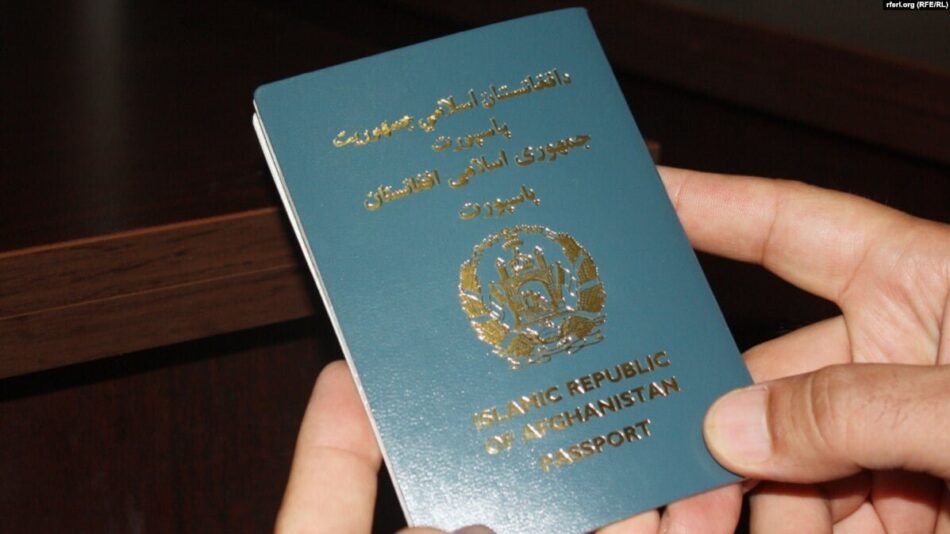Passport distribution agencies in Afghanistan have witnessed enormous crowds recently, attracting attention from both Afghan and foreign media. The Taliban government’s passport department has announced that individuals seeking passports can now apply offline and in person at distribution centers following a prolonged delay. This announcement prompted many Afghans, whose online applications were previously unsuccessful, to flock to passport offices, especially in Kabul. The situation quickly became chaotic, with large crowds assembling behind the passport. As a reporter, I visited the passport office last week to discover why Afghans desperately need passports. Despite facing numerous challenges, I spoke with several individuals determined to obtain their passports.
Through conversations with over 50 individuals in the crowd or through my contacts, I uncovered several reasons for the large gatherings at passport offices.
Before diving into the seven primary reasons, it’s important to highlight two overarching factors.
Firstly, obtaining a passport in Afghanistan has become increasingly challenging over the past two and a half years, leading to a rise in financial fraud. Some individuals have reported paying over a thousand U.S. dollars to so-called “commissioners” to secure a passport. While Taliban officials deny the existence of corruption and bribery in passport issuance, evidence suggests that a significant number of people have obtained passports through such means.

Secondly, it is difficult for ordinary Afghans to obtain a visa for any country worldwide, even if they get an Afghan passport. This includes neighboring countries such as Pakistan and Iran. Some countries have already removed Afghanistan from their online visa application forms, further complicating the process for Afghans. Although Pakistan and Iran do offer visas to Afghans, they are typically issued under strict conditions and often sold on the black market for thousands of dollars, a sum beyond the reach of most Afghans. Notably, Pakistan has ceased issuing visas to Afghans since the beginning of January, a move Pakistani authorities attribute to technical issues. However, some experts suggest it stems from strained relations between Afghanistan’s ruling Taliban government and Pakistan.
After interviewing 50 passport applicants, I identified seven primary reasons why passport distribution agencies in Afghanistan are overwhelmed.
1- Seeking Medical Treatment Abroad
Among the individuals I spoke with, 14 mentioned the dire need for medical treatment, which is unavailable in Afghanistan. The country’s healthcare infrastructure, already weakened by decades of conflict and underinvestment, has further deteriorated with the reduction in foreign aid following the Taliban’s takeover. Hospitals and clinics are ill-equipped to handle complex conditions, leading these 14 individuals to seek treatment abroad, with Pakistan and Iran being the primary destinations for their medical needs.
2- Escaping Poverty and Unemployment
The economic challenges have been particularly harsh for those previously employed by the government or non-governmental organizations. Eight people interviewed expressed that unemployment and poverty were their primary reasons for seeking passports. They represent a fraction of the broader population affected by the economic downturn and the cessation of international support, driving them to look for work opportunities abroad to support their families.

3- Visiting Family and Relatives
Maintaining cross-border familial ties was crucial for the seven individuals I talked to. These Afghans, who have family in neighboring countries like Pakistan and Iran, find themselves hindered by recent visa restrictions and border controls. The significance of these connections cannot be understated, and for these seven individuals, obtaining a passport is the first step in overcoming the bureaucratic barriers to family reunification.
4- Participation in Evacuation Processes
Seven people mentioned they were part of ongoing evacuation efforts by foreign countries but were hindered by the lack of passports for themselves or their relatives. This necessity underscores the urgency of their situations, as these evacuations represent a path to safety away from the uncertainties present in Afghanistan today.
5- Seeking Freedom and a Better Life
The longing for personal and social freedoms drove at least six interviewees to seek passports. These individuals, both young Afghans and families, have experienced the freedoms of the past two decades and are now facing the Taliban’s restrictive measures. Their pursuit of passports is motivated by a desire to find a new home where education for girls and personal liberties are safeguarded, reflecting broader concerns within the population about the erosion of these fundamental rights.
6- Activists at Risk
Among the crowd, six individuals stood out for their previous or current involvement in activism, journalism, or human rights work. These individuals, aware of the dangers posed by the Taliban towards those who dissent or engage in activities deemed unacceptable, see obtaining a passport as essential for their escape. The precarious situation for activists in Afghanistan is stark, with passports offering a potential route to safety for those who have been targeted or fear persecution.
7- Improved Acceptance in Western Countries
A sentiment shared by a few, precisely two individuals, was the belief in improved chances of acceptance into Western countries amidst the current circumstances. This perception has prompted them to apply for passports, viewing it as a pivotal step towards potentially securing asylum or refugee status in nations more receptive to those fleeing the Taliban’s rule.
As mentioned, I only interviewed about 50 Afghans applying for a passport for this article. Among the thousands of Afghan passport applicants, some may have different reasons for seeking a passport than those listed here. But what is evident is that the number of people who want to get a passport in Afghanistan is in the hundreds of thousands.
The surge in passport applications has overwhelmed the Taliban government’s passport agency, which struggles to issue passports on time and routinely due to limited capacity, leading to irregularities, bribery, and other issues. Furthermore, the lack of international recognition for the Taliban complicates the use of passports issued during the previous republic, adding another layer of difficulty for Afghans seeking to travel abroad.





